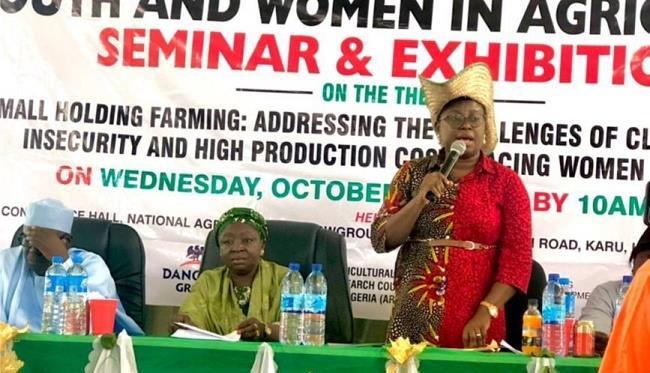Chairperson, National Agric Show Youth and Women in Agriculture Committee, Mrs. Nkiruka Okonkwo, says closing gender gap in agriculture can contribute $1 billion annually to the nation’s Gross Domestic Product (GDP).

Okonkwo spoke on Thursday, November 28, 2024, at the National Agric Show Youth and Women in Agriculture Seminar at the Show Ground in Tudun Wada, Nasarawa State.
She presented the keynote paper titled “Incentivising Women, Persons with Disabilities (PWDs) and Young Smallholder Farmers Towards Attaining Food Security in Nigeria.’’
Okonkwo said it was imperative for the country to target investment towards boosting women farmers’ participation.
She is also the Chief Executive Officer, Fresh and Young Brains Development Initiative (FBIN).
Okonkwo said that the gesture would, as well, boost the farmers’ productivity as they would capitalise on the potential economic gains.
The chairperson said that the country’ s agriculture sector held immense potential for growth, employment and food security.
Okonkwo said that empowering women, youth and PWDs smallholder farmers was critical to the nation’s food security.
She said that such could be done by providing targeted incentives, strategic interventions, multi-stakeholders collaboration, policy support and innovation solutions as well as an enabling environment.
Okonkwo said through such initiatives or efforts, the country could unlock their potential; enhance their productivity and contributions to national food security.
“Women play a vital role in Nigeria’s agricultural sector; contributing 70 per cent of the agricultural workforce and 60 per cent of smallholder farmers; however, they face numerous challenges.
“These challenges include limited access to land, finance, gender-friendly and affordable technology and markets, poor training, social and cultural barriers, climate change and environmental degradation
“On their part, young people constitute about 60 per cent of Nigeria population and 30 per cent of agricultural workforce; bringing energy and innovation technological savviness and entrepreneurial spirit to the sector.
“Nigeria can advance further in agriculture if women, youth, PWDs are freed from socioeconomic constraints.’’
She said it was pertinent for the government and stakeholders to invest in gender-disagregated data collection, especially budget and expenditure data to facilitate analytics and evidence-based policy making
According to her, the gesture will enhance women and empowerment in the sector.
She recommended separate budget lines in the annual budgets for women, youth and PWDs.
“Let us collectively commit to empowering women, PWDs and youth small holder farmers; together, we can improve food security, enhance livelihoods and drive economic growth.
“Women, PWDs and young smallholder farmers are critical in achieving food security in Nigeria.
“So, it is necessary to enhance their access or capabilities, participation and quality of influence through financial incentives, technical assistance, market access, technology adoption and social protection.
“Enabling women and youth to thrive in the sector requires two main categories of incentives targeted and strategic–women-focused incentives which include land ownership, tenure security, access to finance and social protection and safety nets.
“Youth-focused incentives include agricultural entrepreneurship training, access to innovative finance, youth-friendly technology and digitalisation.
“Others are apprenticeship, volunteerism, mentoring and agribusiness incubation, market and linkages, policy support and advocacy” she said.
Okonkwo said that the seminar was a key component of the annual Agric Show aimed at creating opportunities for visibility.
